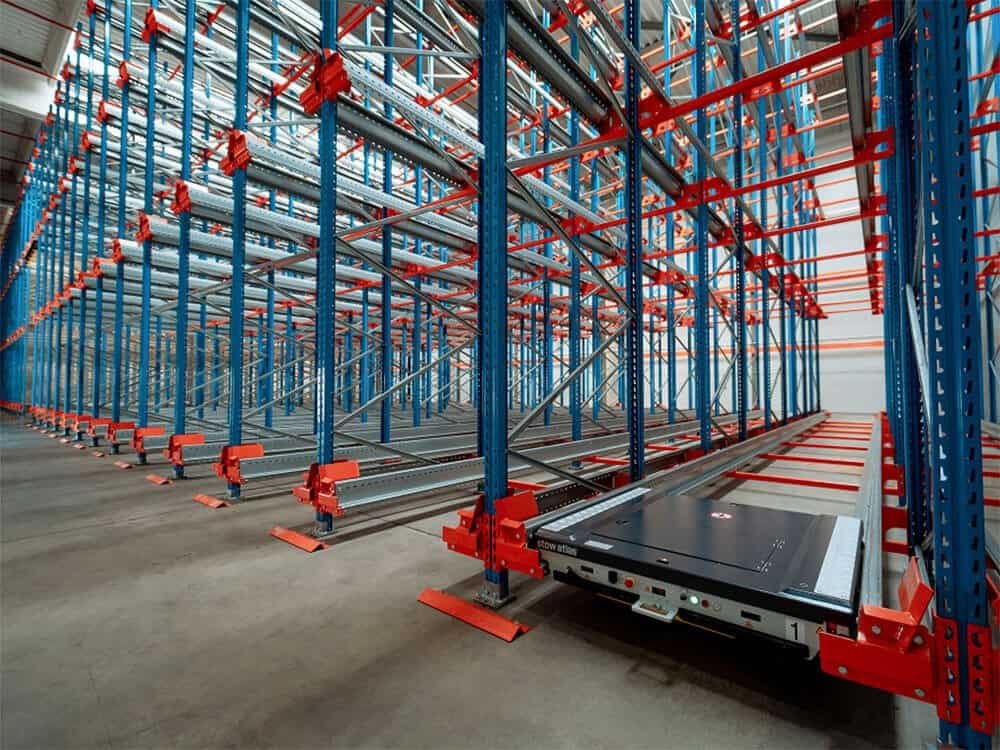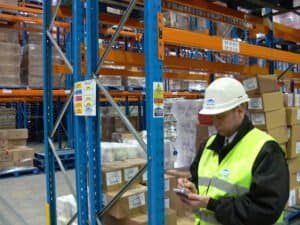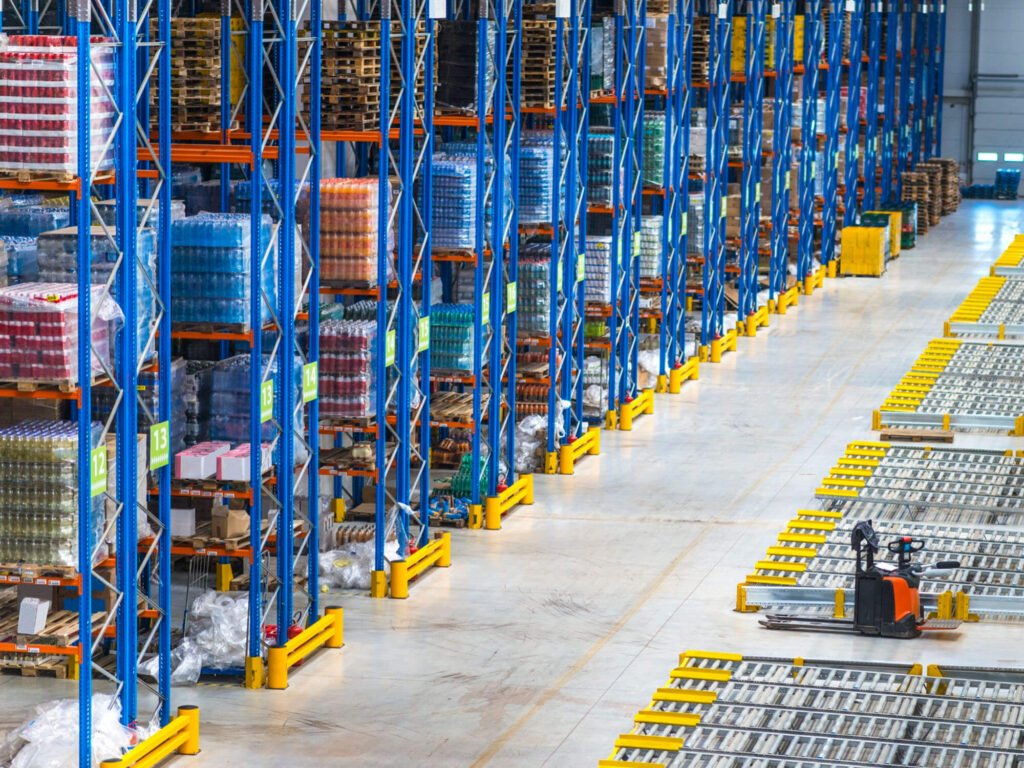Is your loading dock overloaded with goods and your warehouse running out of space? No need to panic; there is a better method for storing and moving inventory. Shuttle racking can resolve these issues efficiently and help make the most of the available space.
It helps in organizing things, reduces time spent on work-related tasks, and offers simplicity. In this article, you will understand how and why it is a favorable decision in the year 2025. So, keep reading!
Figure 1: shuttle pallet racking
1) What Is Shuttle Pallet Racking?
Pallet shuttle systems racking is a method of storing pallets in a warehouse. It optimizes storage space and provides higher-density storage.
In this system, there is a machine called a shuttle. A shuttle moves pallets within the rack. You do not need to use a forklift to drive deep into the shelves. You put the pallet in front, and the shuttle brings it inside. This increases productivity and safety.
Figure 2: What is shuttle pallet racking?
Now let’s examine how the system functions. There are two categories. One type is semi-automatic. In this case, you operate the shuttle using a remote control. The other category is fully automatic. This type works independently using computers.
Therefore, if your warehouse is filled with products but lacks space, shuttle pallet racking can assist in time and space efficiency.
2) Key Components of a Shuttle Racking System
In order to understand how the shuttle system functions properly, there are essential components. Every component performs an important function. In this section, we will discuss them one by one:
Figure 3: Components of shuttle pallet racking
- Upright: First of all, the vertical frame that supports the entire system is referred to as the upright. To begin with, it functions like the backbone of the rack, carrying all the weight and maintaining stability.
- Beam: The beam completes the connection of two uprights. It also provides horizontal support and sustains some of the weight of the pallet rails.
- Radio Shuttle: Next, the radio shuttle is the smart cart that works within the racks. Most importantly, it does the loading and unloading of pallets automatically, hence your forklift is not required to go deep into the rack.
- Rail: The rail is fitted on every level of storage. It serves to make the shuttle’s movement during pallet loading and unloading seamless in the next step.
- Pallet Centralizer: Then, the role of the pallet centralizer is to control the position of each pallet. Through this method, mistakes are avoided when the shuttle is performing pick-up or drop-off actions.
- Battery: In addition, the shuttle operates on a rechargeable battery. Because of this, no wires are hindering the movements of the shuttle.
- External Rail Support: External rail support reinforces the existing rail system. Consequently, the rack is able to support even greater loads without any risk of warping.
- Rail End Stopper: Each rail has a rail end stopper situated at the far end. In the end, it prevents the shuttle from going off the track, stopping the risk of damage or accidents.
- Remote Control: You give commands to the shuttle using a remote control. With a few clicks, you can load, move, or retrieve pallets in a fast and secure manner.
3) How Shuttle Pallet Racking Works
Now that you are familiar with the components of the shuttle rack system, let’s discuss how the system operates sequentially in by step-by-step process.
Figure 4: How Shuttle Pallet Racking Works
Step 1) Loading Process: Initially, a forklift delivers a pallet and positions it at the front of the rack. This location is referred to as the loading zone.
Step 2) Shuttle Movement Inside the Racking: The scheduled shuttle then picks up a pallet. After this, the shuttle moves along its designated path and transports the pallet to a vacant location.
Step 3) Storage and Retrieval Process: As the shuttle arrives at the location, it carefully lowers the pallet. When the time comes for retrieval, the shuttle raises the pallet back to the front, where a forklift retrieves it.
Step 4) Safety and System Monitoring: Lastly, your systems have interfaces with protective measures in place to mitigate harmful incidents. Your staff or you personally are able to monitor the shuttle live from screens and control interfaces.
4) Types of Shuttle Pallet Racking
Different types of shuttle pallet racking systems exist. Each one has a unique manner of functioning to assist in the easy storage and movement of pallets. Let’s discuss them one after the other:
i) Semi-Automated Shuttle Racking
As for the first type, the movement of the shuttle is controlled by a remote. A forklift sets the pallet in front of the rack. Afterward, the shuttle takes the pallet to the correct location within the rack. The shuttle returns to the front and retrieves the pallet for you when you need it.
Although this system is simple, time-efficient, and saves effort, it still requires a worker to command via remote control.
Figure 5: Semi-Automated Shuttle Racking
ii) Fully Automated Shuttle System
This is a refined system that is fully automated. The shuttle control system integrates hardware and software components to manage the shuttle’s operations. There is no need for employees at the site. Systems automatically manage everything.
The shuttle has full knowledge and understanding of where to store and pick up each pallet. If you seek faster work processes as well as reduced human workers in the warehouse, this is the right option for you.
Figure 6: Fully Automated Shuttle System
iii) 2-Way Shuttle System
Moving on, this shuttle can only move forward or backward. This would be effective if your racks are organized in straight lines without turns. Suitable for long and deep rack warehouses with limited floor space.
Figure 7: 2-Way Shuttle System
iv) 4-Way Shuttle System
This shuttle is equipped with more advanced movement capabilities as it can now move backwards, forwards, left, and right. This enables you to have more control. You can maneuver pallets throughout racks with fewer forklifts. Big warehouses where every single inch of the space needs to be utilized will benefit perfectly from this.
Figure 8: 4-Way Shuttle System
v) Automated Storage and Retrieval System
This is the most advanced type. It operates using a system known as Mother-Child. The mother is a large shuttle that operates on a main loop. She carries smaller child shuttles that transport pallets from different locations within racks.
This system operates simultaneously at multiple tiers. It is fully automatic and incredibly speedy. Especially beneficial for high-throughput warehouses, such as those utilized by large e-commerce retailers or cold storage facilities.
Figure 9: Automated Storage and Retrieval System
5) Advantages of Shuttle Pallet Racking
Shuttle pallet racking helps businesses operate more efficiently and enhances workplace safety. In this section, we will go through all the benefits that Shuttle’s pallet racking systems offer.
Figure 10: Advantages of Shuttle Pallet Racking
+ High Storage Density racks: To start with, this system allows you to store more pallets in less space. For deep storage systems, the shuttle’s vertical lift enables it to move deep within the rack, which removes the need for wide aisles between each row. This makes optimal use of the available storage area.
+ Faster Loading and Unloading: The shuttle also transports pallets in a seamless and quick manner. While a pallet is being loaded in, another pallet can be removed at the same time. This efficiency accelerates operations, minimizing any possible interruptions inthe warehouse workflow.
+ Reduced Forklift Travel Time: An additional large advantage is that forklifts remain at the front of the racks. They do not need to go far into the aisles. This means you save time, cut down on fuel or battery usage, and avoid making sharp turns.
+ Better Space Utilization: Moreover, you can maximize your warehouse space. As your aisles shrink or are eliminated, even corners and hard-to-reach areas can be utilized for storage.
+ Suitable for Cold Storage: Additionally, this system is appropriate for cold storage. Since cold rooms are expensive, storing goods in a compact manner is highly beneficial. Reduced forklift traffic also minimizes the escape of cold air, thus conserving energy.
+ Improved Worker Safety: Last but not least, safety is a major positive. There are reduced chances of accidents since the forklifts don’t go within the racks. Employees are now stationed in safer zones, and the shuttle does the heavier lifting.
6) Common Applications of Shuttle Pallet Racking
Shuttle pallet racking is used across various industries. This system is highly beneficial for companies that need to relocate and warehouse large quantities of goods. Here we will industries where shuttle pallet racking is the best fit:
Figure 11: Uses of Shuttle Pallet Racking
i) Warehousing and Distribution Centers: First of all, this system is very common in big warehouses. It offers better space utilization, improved picking rates, and decreases lift truck congestion. Thus, it is ideal for active distribution centers.
ii) Cold Storage and Frozen Goods: In addition, shuttle racking systems are suitable for cold storage rooms. It provides optimized storage space, which reduces cooling expenses. Moreover, limited personnel movement within the cold area balances temperature stability.
iii) Food and Beverage Logistics: For any business in the food sector, time is of the essence, and maintaining freshness is critical. This system promotes quick food movement and helps preserve freshness. It also maintains cleanliness and orderliness in storage areas.
iv) Manufacturing Facilities: Production facilities and distributors usually work with large quantities of products. Shuttle shelving helps to maintain both raw materials and finished goods in an orderly manner as well as improves the workflow.
v) E-commerce Fulfillment Hubs: Lastly, in online shopping warehouses, time is of utmost importance. Shuttle racking systems ensure that stock is easy to track, pack, and pick up swiftly. Shuttles will assist with order identification, facilitating streamlined customer satisfaction.
7) Shuttle Racking vs Other Systems
Understanding the differences between shuttle pallet racking and other storage systems is essential. Now we will discuss the key difference:
| Feature | Shuttle Racking | Drive-In Racking | Mobile Racking System | Stacker Crane AS/RS |
| Storage Density | Very high | High | Medium | Very high |
| Forklift Entry | Not needed (shuttle moves inside) | Forklift drives into racks | Forklift needed | Not needed (stacker crane handles pallets) |
| Speed | Fast (shuttle moves quickly) | Slow (forklift enters deep aisles) | Medium | Fast (crane moves vertically and horizontally) |
| Automation | Semi or fully automated | Manual | Manual or semi-automated | Fully automated |
| Safety | High (less forklift use) | Lower (forklifts inside the rack) | Medium | Very high |
| Cost | Medium to high | Low | Medium to high | High |
| Best For | Fast-moving goods, cold storage, and deep lane storage | Low-budget, low-turnover items | Medium-sized warehouses | Very large warehouses need full automation |
Final Thoughts
Shuttle pallet racking is a great option if you want to make the most out of the space you have in your business. With this technology, your employees can be more productive, your goods will be secured, and time will be saved during retrieval. You can use them in cold storage facilities, large warehouses, or active manufacturing plants.
It provides great working efficiency regardless of whether you are starting from scratch or if you need more advanced features. Here at Lracking, we design and manufacture strong shuttle racking systems that help improve your warehouse efficiency. Contact us today and let us help you get dependable, tailored storage solutions!




